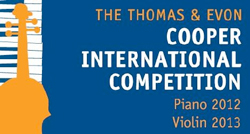by Daniel Hathaway

On Tuesday afternoon and evening, July 23, that unlikely possibility became a reality as ten violinists, ages 15 to 18, played the concerto round of the Cooper Competition in Oberlin’s Warner Concert Hall, giving a fascinating look into the musical personalities and technical prowess of the competitors, who were vying for the opportunity to become one of three finalists to play these pieces with The Cleveland Orchestra on Friday evening in Severance Hall.
All ten players, having passed the entrance auditions and survived the semi-final rounds, have certified that they are fine musicians who have the technical wherewithal to play every note of their chosen concertos. We were interested in discovering during this round who best communicated the intentions of the composers to the audience and who interacted most collegially with the “orchestra” — in this case one of four excellent pianists (Alicja Basinska, Elizabeth DeMio, Yu Sakamoto and Roberta Whitely).
This pair of ears was particularly impressed by four performances on Tuesday (discussed in playing order).
18-year old Shuaishuai Lin (Shengang, China) played a supple and sweetly playful version of the Tchaikovsky concerto, varying his tone color and using subtle rubato. His pacing showed a thoughtful understanding of the structure of the piece. Once he settled in, his tone was rich and even, and he maintained a full sound even in soft passages in the slow movement. His high harmonics toward the end whistled like small birds.
15-year old Jieming Tang (Hefei, China), performing with Elizabeth DeMio, showed a fine grasp of style and musical content in his stylish performance of the Mendelssohn concerto. Expert shaping of phrases and musical events and a thorough command of dramatic flow made this reading special. His interactions with the piano were easy and natural, and he sought out every nuance in the music.
17 year-old Naoko Tajima from Tokyo took on Shostakovich’s first concerto, playing with a dark, expressive tone at the beginning, then turning appropriately angular and demonic for the second. Her Passacaglia was intense, the cadenza into the fast part of the finale brilliant.
Perhaps it’s in her Scandinavian genes, but 16-year old Ava Bahari of Gothenburg, Sweden, ended the concerto round with a winningly mature reading of the Sibelius concerto that sounded right in every way. Her lean, dark tone, tight vibrato, and well-scaled playing served Sibelius well. Only in the theme of the last movement did some detail go missing.
Other creditable performances of the Tchaikovsky were played by Kyumin Park (16, Seoul, South Korea) and William Ching-Yi Wei (18, Tainan, Taiwan). Park’s reading was strong but cautious. He played long, connected phrases that needed some breathing places. His aggressive approach to the last movement was exciting and showed fine bow control. Wei, whose stage presence was a bit cocky, played with a sense of romantic abandon that sometimes bordered on self-indulgence. He seemed to want to make as much sound as possible at all times, which might have become tedious had his tone not been so attractive to listen to.
Angela Wee, 16, from Woodbury, NY, also went for a big, plummy sound, good for Brahms but overly opulent for Sibelius (the concerto she played) and resistant to dynamic and color contrast. Her interpretation needed more attention to context and musical form (she raced through the cadenza near the opening as though she didn’t know quite what to do with it).
Two versions of the Brahms concerto were served up by Ashley Park (16, Old Tappan, NJ) and Gallia Kastner (also 16, from Arlington Heights, IL). Park played with a lean tone well supplied with vibrato which sometimes disappeared into the piano sound at lower dynamic levels. Her phrasing was elegant, especially in the cadenza, and her rhythm strong in the finale, though she rushed a bit in the development.
Kastner began the Brahms more aggressively but seemed to take a while to find the center of her tone, which sounded uneven. But her sense of romantic style was strong and she put the concerto across convincingly even if she didn’t quite get under the skin of the finale.
Ming Lu (18, Shanghai, China) was another player who brought a big, vibrant sound to her concerto, in this case Prokofiev No. 2. While her evenness of tone and shaping of phrases was masterful, her reluctance to change color and the intensity of her vibrato eventually began to wear on the ear. Though she struck poses aimed at the audience, Lu paid little collaborative attention to her pianist.
Postscript: Following the evening concerto round, the jury advanced six players to Wednesday’s recital round (pictured above): Kyumin Park, Ming Liu, Gallia Kastner, Angela Wee, Jieming Tang and Ching-Yi Wei.
Published on ClevelandClassical.com July 25, 2013
Click here for a printable version of this article.


